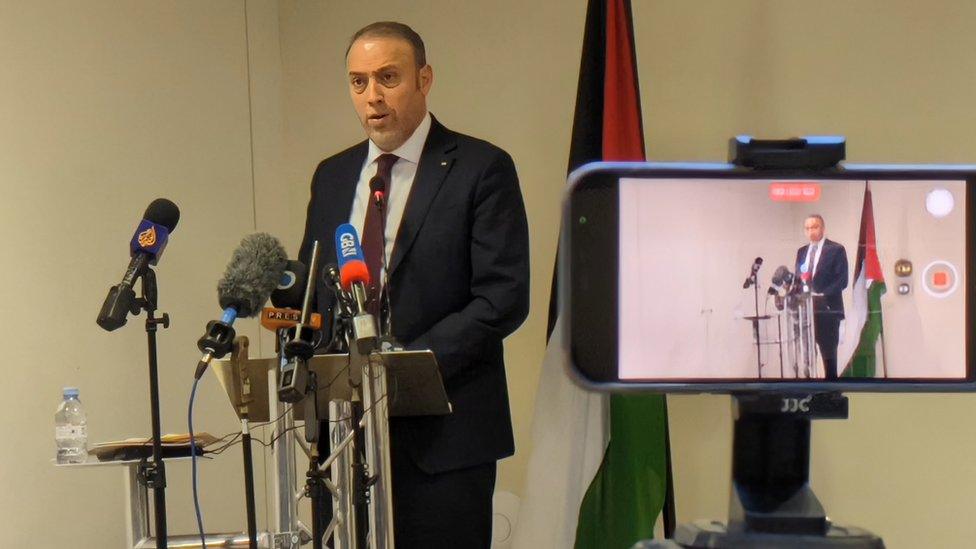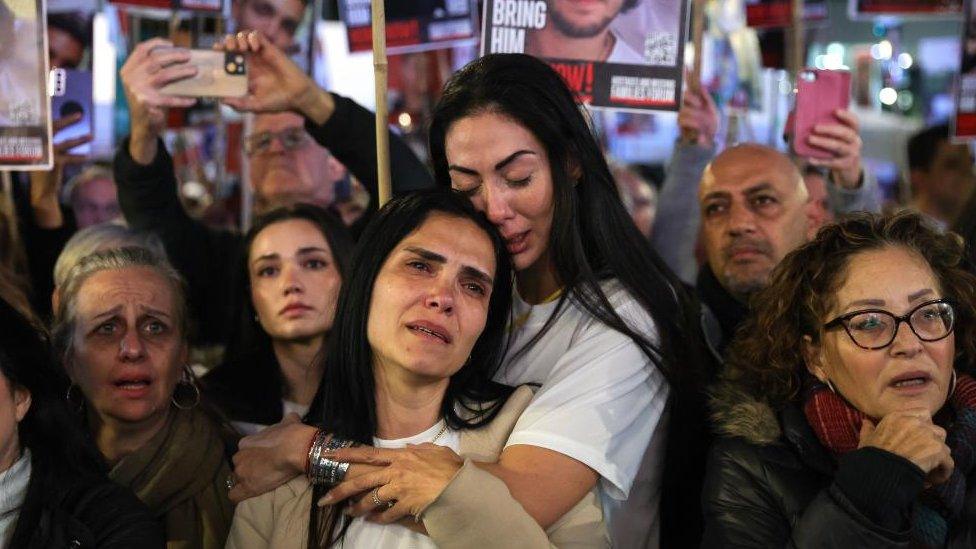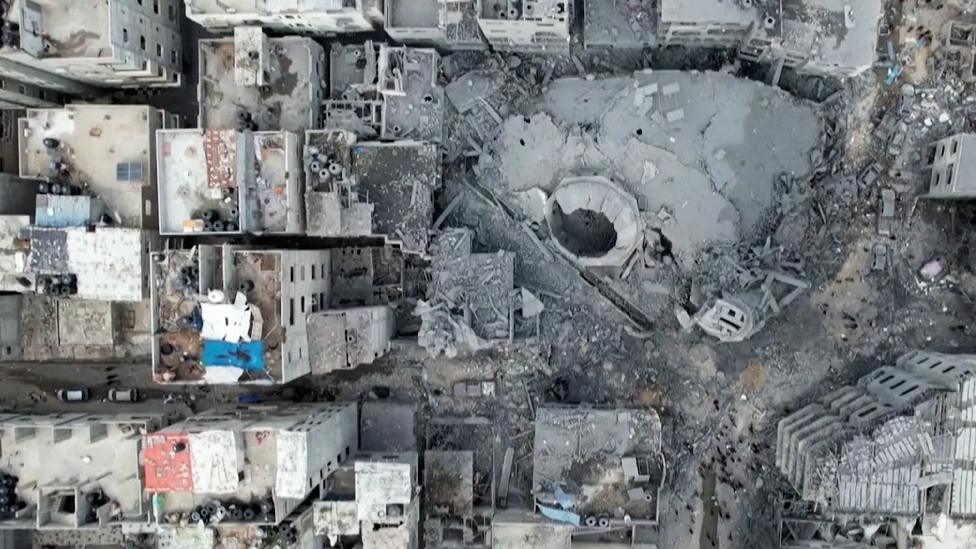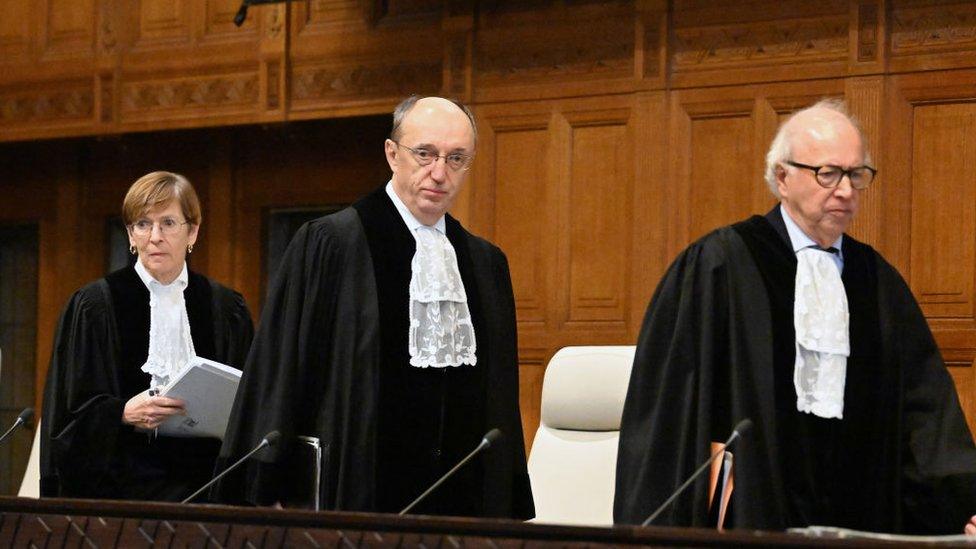Palestinian envoy Husam Zomlot says UK guilty of hypocrisy
- Published

Mr Zomlot said British policy towards Israel and the Palestinians was inconsistent
The Palestinians' top envoy to the UK has accused the government of "double standards and hypocrisy" in its policies towards them.
Husam Zomlot criticised PM Rishi Sunak for opposing an application at the International Court of Justice accusing Israel of genocide in the war in Gaza.
The UK had suffered "reputational damage" in the Middle East, he said.
But he welcomed a recent decision by the government to ban violent Israeli settlers from entering the UK.
Last month, UK Foreign Secretary David Cameron said on X that settlers responsible for attacks on Palestinians would be barred, external. The move followed the announcement of a similar plan by the US.
"[This is] welcomed," said Mr Zomlot. "In my opinion that was a very significant moment - not because of the policy itself but because this is the first time in 75 years the UK takes any step that has to do with sanctions [on Israel]."
There has been a reported rise in violence by settlers in recent months, external, especially since the mass Hamas attacks on Israel on 7 October and the Israeli military campaign in Gaza which followed.
There are about 700,000 Jewish settlers who live in some 140 settlements in the West Bank and East Jerusalem, areas occupied by Israel since the 1967 Middle East war and claimed by Palestinians for a future state.
The settlements are considered illegal by most of the international community, though Israel disputes this.
However, Mr Zomlot condemned a government bill banning public bodies from boycotting economic activity with Israel or Israeli settlements. The bill passed its third and final reading in the House of Commons last Wednesday and will now go to the House of Lords.
"This is the inconsistency," Mr Zomlot said at a news conference in London. "Where are you [the UK] exactly? Do you consider Israel's occupation of the 1967 borders to be a military occupation and colonisation?
"There is such inconsistency in the UK policy that I... no longer understand if you ask me 'What is the UK policy vis-a-vis Palestine?' I don't know. Inconsistent, contradictory."
Mr Zomlot, who is the Head of the Palestinian Mission to the UK, also rebuked Prime Minister Sunak for rejecting South Africa's case at the International Court of Justice (ICJ) accusing Israel of genocide.
The ICJ began hearing the case at the end of last week.
A spokesperson for the prime minister said Mr Sunak believed the allegation was "completely unjustified and wrong".
"The UK government stands by Israel's clear right to defend itself within the framework of international law," the spokesperson said.
The UK's opposition to South Africa's genocide allegation, said Mr Zomlot, was "a self-appointment as international judges, it's intervention and interference in the international judicial system".
The UK, he said, was guilty of "double standards" and "hypocrisy" in its approach to Israel and international law.
The envoy accused Israel of an "unprecedented manmade humanitarian disaster" in Gaza, and called on the international community to demand a ceasefire.
"Nothing comes before an immediate ceasefire," he said. "This remains our top, top priority."
About 24,000 people have been killed in Israel's bombardment of Gaza - most of them women and children - since 7 October, according to Gaza's Hamas-run health ministry. Israel launched its war with the declared aim of destroying Hamas after the group killed about 1,200 people, mostly civilians, and took some 240 others back to Gaza as hostages in its attack on Israel.
Correction 13th February: This article wrongly reported that about 1,300 people had been killed following the 7th October attack by Hamas. This was based on counting those who later died from their injuries in addition to the figure of more than 1,200. The article has been amended to now refer to about 1,200 deaths, a figure which includes those deaths and which Israel says is not final.
- Published14 January 2024

- Published15 January 2024

- Published12 January 2024
